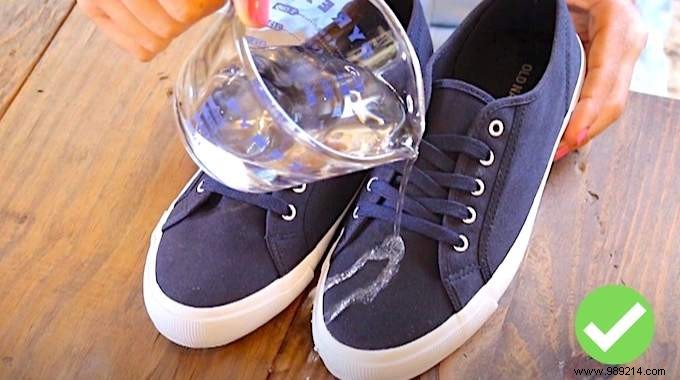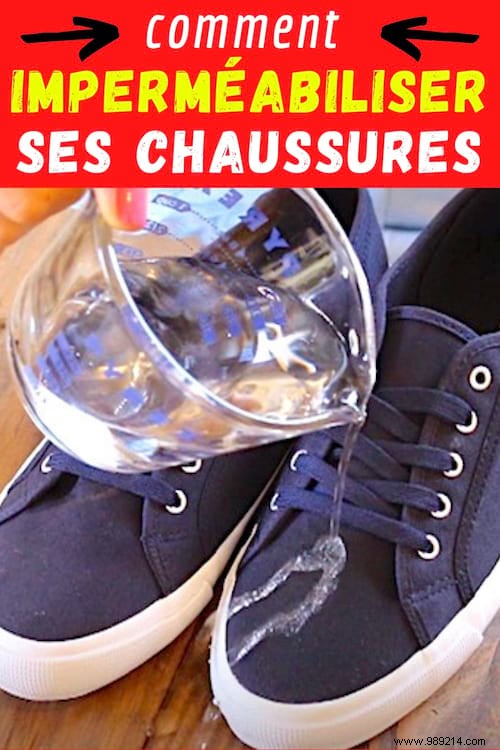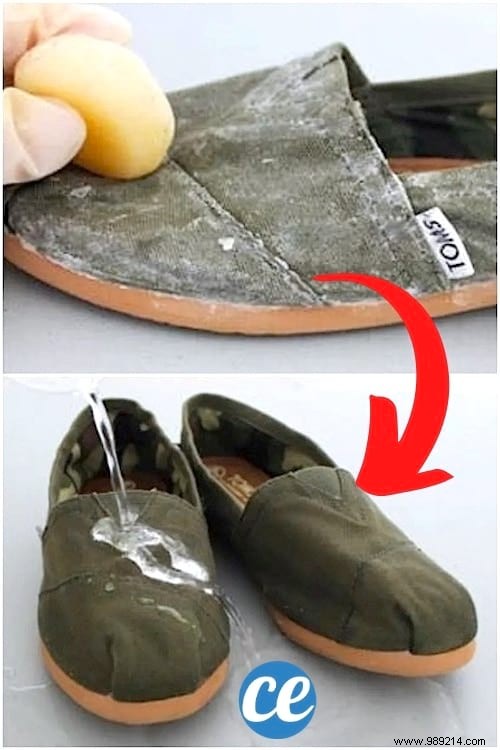
Want to keep your favorite pair of shoes as long as possible?
Start by waterproofing them ! This is the very first thing to do to keep them in good condition.
And for that, there is no need to use chemical sprays that pollute the planet; completely natural "homemade" methods exist!
Here are 2 simple and effective tips for waterproofing your shoes naturally. Watch:

We do not proceed in the same way to waterproof shoes; it depends on the material.
And some materials should not be treated otherwise your new shoes will be ruined forever!
Patent leather, velvet or fancy shoes (with sequins or sequins) , for example, must not be waterproofed.
On the other hand, materials in nubuck, suede, imitation leather, mesh, suede must imperatively be treated.
Sneakers and hiking shoes can also be waterproofed so as not to damage them when it rains.
Before waterproofing them, always ensure that your shoe is well cleaned and dusted.
If necessary, take a cloth or suede brush and scrub.
Now let's go to the instructions for use of the 2 methods.

Here is an economical and ultra-effective method to treat and waterproof canvas shoes.
Take a white candle (like the one used as a tealight) or possibly the same color as your pair of tennis shoes.
Rub the candle over the entire canvas and fix residue using a hair dryer.
Repeat the maneuver several times so that the shoe is well covered with wax.
The thin layer thus created makes it possible to waterproof the fabric!
The drops of water no longer infiltrate the shoe and above all no longer leave ugly halos!
Another tip:if your shoes are high-end or you really don't want to get them wet, always take a shoe cover with you.

Admittedly, it's not very sexy, but it's pretty effective in not killing them in the event of an unexpected heavy downpour.
This protects them all the way.
Finally, if, despite our precious advice, your shoes have still taken on water, do 2 very simple things.
Put some newspaper inside and let it dry. Check out the trick here. The blotter effect is super effective.
Also add one or more scented tea bags inside to allow possible bad odors to escape. Check out the trick here.

Stop buying chemical waterproofing sprays that treat your shoe leather right now!
There is a totally ecological alternative to waterproof your super shoes without harming the planet.
How is it possible ? Using ... BEESWAX !
In addition, the process is very simple.
In a saucepan, pour 2 tablespoons of beeswax nuggets...
...and 1/2 teaspoon of vegetable oil of your choice (olive, coconut or other oil).
Heat the composition in a bain-marie and remove the pan from the heat when the wax is well melted, fluid and homogeneous.
Then take a brush and coat your shoes with the mixture thus created.
Traces can then appear under the effect of the wax which cools, but do not panic, this is completely normal.
They will evaporate a few moments after the drying stage.
Make sure that the leather of your shoe soaks up the solution well by working the mixture into it.
For this, use a hair dryer and an old pair of socks or threaded tights (very clean).
And voila ! Your leather shoes are now fully waterproofed without the use of chemicals.
How often should you waterproof your shoes? As soon as they start taking on water.
As a general rule, every month should be more than enough.
Be careful to only use beeswax on leather or canvas shoes.
Indeed, the solution could remain encrusted on suede or other materials.
Also dedicate your brush to the exclusive application of beeswax.
This rules out any potential incident on other materials.
Remember to clean it well with boiling water and soap after use.
Without it, the bristles of the brush freeze because of the wax.
If this happens by mistake, soak the brush in the solution again:it will then become fully operational again.
Be aware that most leather items can be treated with this method (bags, belts...).
One last thing:if you're advised to waterproof your shoes with petroleum jelly, politely look away.
Also called "petroleum jelly" (that says it all), petroleum jelly is certainly less harmful than industrial sprays, but nevertheless remains toxic.
Prefer to make your own natural petroleum jelly . It's super simple.
Just melt coconut oil, olive oil, beeswax and vitamin E.
The solution thus created is then a perfect substitute for the recipe for a natural waterproofing agent.
When we buy a pair of shoes in a store, the seller often offers us the famous "miracle" waterproofing spray.
But now that you know about natural alternatives, don't give up and say no to these chemicals.
And to finish convincing you (if it were necessary), we list all the chemicals present in an industrial waterproofing product:
The aerosol can itself, solvents, hydrocarbons and paraffin (from the petrochemical industry), nanoparticles...
This list of industrial substances is as destructive to health as it is to the environment.
Tests carried out on these products have also revealed that endocrine disruptors are present.
Microparticles can also cause poisoning by inhalation.
In short, let's put an end to all this! Especially when natural alternatives are known and effective.